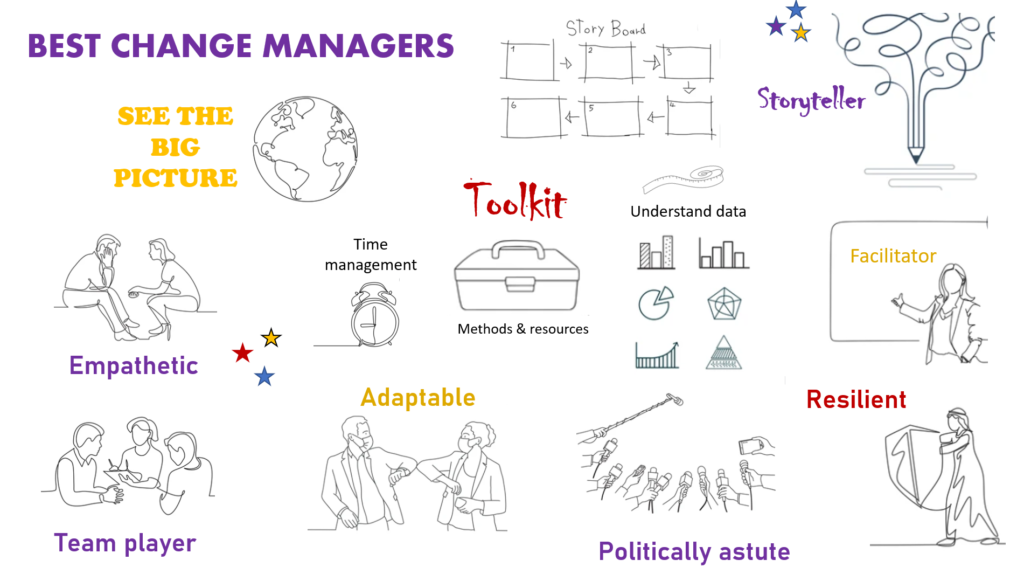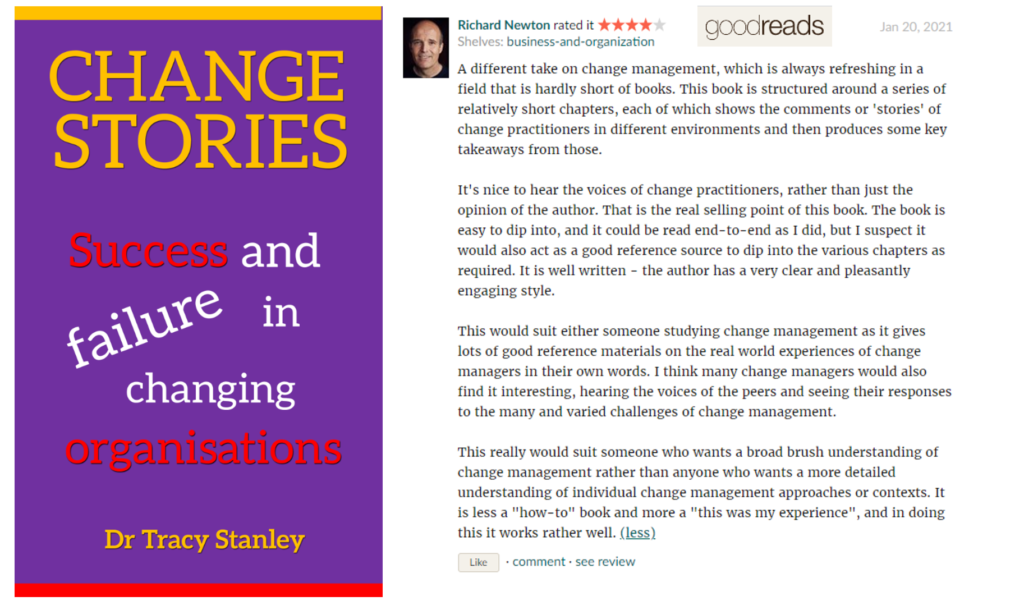
I struggled to create an infographic that reflected the diversity of skills needed to be a great change agent. There are so many.
When I wrote Change Stories: Success and failure in changing organisations it was not surprising that the chapter that looked at the characteristics of the best change managers was one of the longest. It’s important to understand what these capabilities are, and how to develop them because, in the words of Erin,
People come to the change management profession and learn their craft by many different paths. They could come from project management, organisational development, training or communication, to name a few of many paths. Whatever the path a broad skill set is required across the following ten areas.
- Relationship development, empathy, compassion and resilience
- Gravitas – credible, self-aware, professional and confident
- Perspective and insights – sees the big picture, is curious and comfortable with ambiguity
- Attitude – has a learning mindset, is innovative and admits mistakes
- Methodology – broad knowledge of frameworks, tools and processes, and which to apply
- Project management – across resourcing, risks and time management
- Understanding data – requirements, testing, traceability and measurement
- Understanding businesses and disciplines – has broad organisational experience
- Communication, coaching and skills development
- Politically aware.
I’ve shared below a handful of observations about why these competencies are important.
Resilience. Flexibility. Adaptability.
Things change. Scope changes. Patience is needed. The reason why I say patience is that for some organisations, their maturity of change is very low. And we have practitioners with a high level of change maturity who get frustrated going into an organisation with a low level of maturity. I remember one practitioner saying ‘That it is all well and good when you talk about best practice and high performing teams, but in my organisation, they don’t even know how to communicate, before we even think about change management’. So my response was, ‘Why don’t you start there? Carrie
Credibility with senior managers
They’ve got to be able to talk to leaders at very senior levels. Identify who those people are. They can’t just rely on, ‘The PM will tell you who to talk to’. They have to be able to identify key areas and key problems. They have to engage with that person, to develop a rapport. So when they tell me about the impact assessment, I want them to tell me that out of this analysis should come clarity on what we need to communicate with people. I ask,
What strategies did you put in place?
How did you actually do that? Lyn
Planning and resourcing
What good change managers do well include communication planning, working closely with the project manager to ensure that the risks around the changes are discussed and understood. Ensuring that the resourcing for the project management activities – in terms of not just the people but also the budget – all that is in place and we have what they need to implement the change plans. Lionel
Change management as risk management
I see change management as a risk management activity. And I talked about those discussions that you might need to have with senior stakeholders to tell them. Oftentimes they have difficult discussions and you have to get messages understood to get support. Framing it in the context of risk as a project manager is usually pretty effective. Lionel
Good facilitator
Being an engaging workshop facilitator. Not just sending out information, but getting people to practise whatever the thing is they need to do. Elaine
Build resilience
Possess and foster resilience in others. Understanding people’s reactions and how they deal with change. Neil
Understanding other disciplines
I think having a high-level understanding of what goes on in other disciplines helps us to think differently, and allows us to be the effective advocates for end users. Helen
Doesn’t use a standard approach
They are very good at understanding our business and culture deeply. Oscar
Politically astute
In large organisations there are political considerations. You need to be politically astute. There are often more enemies within than outside the organisation. People can white ant you. You need to have people watching your back. Nigel
Use multiple communication channels
Use multiple channels for communication and many times. Similar or same message because not everyone gets it the first time. You need to communicate with the right people at the right time and don’t raise unnecessary expectations. Oscar
Because change management is complex, it looks different in every organisation, because of what you’re trying to change in the strategy, objectives and culture and leadership style in that organisation. What makes a great change manager is to be quite eclectic in their approach. Fiona
Great change managers have a broad range of experience working within different organisations and industries, and across many different types of change. They learn from their experiences, are curious, and continue to invest in their own professional development through on-the-job learning, peer-to-peer networking and keeping informed on best practice insights through their research and other development activities. Leanne
Works well with people across disciplines
I think they need to be able to operate and engage with a broad range of people. I’ve been in organisations where you’re working with tradies and engineers, right through to very technical and non-technical people. You need to be able to build relationships with people from a base grade right up to senior leadership. Leanne
Knowledge of data testing and interpretation
If you’re working in technology, you need to understand data testing and interpretation. Helen
People who have a generally curious mindset can deal with change. They are quite flexible in their mindset and the way they like to work. Samantha
Know when the project is going off the rails
A good change manager knows when the project is going off the rails. You get this sense. Your intuition tells you that this is not going to end well. Your clients could be concerned about what stakeholders are doing. And you’re watching them, and you’re like, ‘You know what? No, just let’s just leave them be for a minute, I think it’s gonna come good’. And it does. It’s that kind of thing. You got to also know when to leave them alone. Ingrid
Tells it like it is
Don’t be shy to tell the powers-that-be, such as the steering committee, in simple straight language but with evidence. Some people are reticent to state their true opinion. They always try to skirt around some of the issues and paste over the cracks. Don’t make it nice, because if you don’t tell it the way it is, you know, you’re doing a disservice to yourself. Neville
Appreciates that change is hard work
It’s necessary to use your coaching skills to gather leader views and knowledge where complex changes cross multiple divisions and teams. It’s getting the data in such a way, to position it and say this should be both the plan that we could present moving forward and be able to change as well. I used to work with a PM who said, ‘You just deal with the fluffy stuff’. And I said, ‘This fluffy stuff is hard work and I’m putting together a plan based on all these bits of information, to support people who don’t ultimately understand what the change is, leaders who can’t articulate it, perceptions of gains and losses and I’m trying to piece that all together,
‘Right. I’ll give you fluffy stuff.’ Therese
Interested in learning more?
For more insights on the many competencies required to be a successful change manager, you can buy my book of Change Stories here.
References
(2020) Stanley, T. Change Stories: Success and failure in changing organisations
